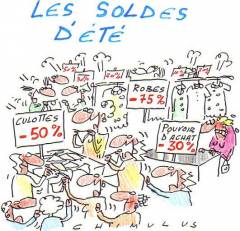09/07/2013
Habillement : 1 emploi sur 10, peut-être menacé à la fin de l'année

Entre mauvais temps et période de crise, le secteur de l'habillement souffre. Si l'arrivée des soldes estivales pourraient, si ce n'est inverser la tendance, sauver les meubles, les professionnels de l'habillement craignent des retombées catastrophiques à la fin de l'année.
"Si on loupe les soldes et que la saison hivernale n'est pas bonne, à la fin de l'année c'est un emploi sur dix qui est menacé dans le secteur " alerte Bernard Morvan, président de la Fédération nationale de l'Habillement (FNH). "Et cette menace pèse sur les 80 000 employés, je ne sais pas si vous imaginez!"
Selon l'Institut Français de la Mode (IFM), le secteur a enregistré le mois dernier un recul de 10% par rapport au mois de mai 2012, et au total pour les quatre premiers mois de l'année des pertes s'échelonnant de -14% à -7% selon les circuits de distribution.
Moins de français feront les soldes cette année
 Pour autant ce chef d'entreprise veut rester confiant. En louant le beau temps au rendez-vous pour cette première journée de soldes, il affirme avoir eu des retours positifs de ses propres boutiques. "Ce matin, il y a du monde dans les magasins!" annonce joyeusement Bernard Morvan.
Pour autant ce chef d'entreprise veut rester confiant. En louant le beau temps au rendez-vous pour cette première journée de soldes, il affirme avoir eu des retours positifs de ses propres boutiques. "Ce matin, il y a du monde dans les magasins!" annonce joyeusement Bernard Morvan.
Mais cet optimiste se heurte aux sondages. Selon une étude Ipsos réalisée auprès de 900 personnes, 29% des Français sont prêts à renoncer aux soldes, alors qu'ils n'étaient que 23% l'année dernière. De même le budget moyen des français passerait de 223 euros à 208 euros. Dans l'ensemble, 69% des Français font plus attention à leurs dépenses qu'il y a un an, confirme un autre sondage Pouleo/CCM Benchmark, réalisé auprès d'un panel de 1.200 personnes.
La fin des soldes flottantes
En marge du marasme ambiant, la députée socialiste Annick Le Loch a déposé hier un amendement qui supprime les deux semaines de soldes flottantes accordées aux commerçants en 2009 et, en contre partie, augmente de 5 à 6 semaines les deux périodes traditionnelles de soldes. "Le consommateur ne sait plus quel est le juste prix, les soldes flottantes entraînant une confusion supplémentaire dans un paysage où se mélangent soldes, démarques, promotions, déstockages" a déclaré la députée.
Une solution largement insuffisante pour Bernard Morvan: "On fait tout un pataquès sur cet amendement pour pas grand-chose. En réalité, ces deux semaines de soldes flottantes sont déjà utilisées la plupart du temps par les commerçants en complément des périodes des soldes". Pour le président de la FNH il faut tout remettre à plat. "Est-ce que les prix de nos produits ne sont pas trop élevés? " interroge-t-il. "On anticipe les soldes en augmentant les prix, ce n'est pas la solution. On a un système hérité de pratiques anciennes, il faudrait tout changer" ajoute-t-il. La FNH attend la réunion d'une table ronde sur le sujet.
Article publié par l'Humanité
Retail Clothing Industry – One Job in Ten May Go by End of Year
Translated Friday 5 July 2013, by
 As the traditional summer sales open on June 26, the retail clothing industry is worrying about the repercussions of a season that has been worse than simply morose. One job in ten could go by the end of the year if the trend continues.
As the traditional summer sales open on June 26, the retail clothing industry is worrying about the repercussions of a season that has been worse than simply morose. One job in ten could go by the end of the year if the trend continues.
Caught between bad weather and the recession, the retail clothing industry has been suffering. While the arrival of the summer sales might, if not reverse the trend, at least salvage something, the retail clothing industry fears catastrophic repercussions by the end of the year.
“If we screw up the sales and the winter season isn’t good, at the end of the year, one job in ten in the sector will be threatened,” warned Bernard Morvan, the president of the National Retail Clothing Federation (FNH). “And this threat is dangling over the heads of 80,000 workers – Can you get your head around that?!”
According to the French Fashion Institute (IFM), last month the sector chalked up a 10% fall compared to May 2012, and overall losses are running from 7% to 14% for the first four months of the year, according to the distribution networks.
Fewer French people will shop the sales this year.
For all that, Bernard Morvan, who also chairs a company, is trying to remain confident. While praising the good weather that has come in time for the first day of sales, he states that his own shops are reporting positive results. “This morning, there’re people in the shops!” he announced joyfully.
But his optimism runs counter to the polls. According to an Ipsos poll of 900 people, 29% of the French are ready to give up on the sales, whereas last year it was just 23%. Similarly, the average sales budget has fallen from 223 to 208 euros. A Pouleo/CCM Benchmark poll of 1200 people shows that, overall, 69% of the French are keeping a closer eye on their spending than a year ago.
The end of “soldes flottantes” [1]
Amid the ambient stagnation, Socialist deputy Annick Le Loch yesterday tabled an amendment eliminating the two weeks of “soldes flottantes” accorded to retailers since 2009, counterbalanced by an increase in the two traditional sales periods from five to six weeks. “The consumer no longer knows what the exact price is because the “soldes flottantes” result in additional confusion in an environment in which sales, mark-downs, promotions and clearance sales are all jumbled together,” the deputy stated.
Bernard Morvan says the solution is quite insufficient: “They’re making a big fuss about this amendment which doesn’t amount to a hill of beans. In reality, retailers are already mainly using the two weeks of “soldes flottantes” to lengthen the sales period.” The president of the FNH says it’s necessary to go back to square one. “Aren’t the prices of our goods too high?” he asked. “We anticipate the sales by upping prices, and that isn’t the solution. We’ve got a system that is handed down from by-gone practices. Everything’s got to be changed,” he added. The FNH is waiting for a round table meeting on the subject.
[1] In France, retailers are entitled to two sales periods at specific times (the first one usually starts mid-January and the next one begins at the end of June). They have, however, been entitled to plan two extra weeks of sales during a period that they are free to choose; that is to say, they are allowed to position those sales at whatever time of year they wish. Those sales are called “soldes flottantes.”
16:24 Publié dans Actualités, Article en Anglais, Article in English, Economie, Société | Lien permanent | Commentaires (0) | Tags : emploi, english article, salaires, pouvoir d'achat, consommation, crise, météo, marques d'habillement, soldes |  |
|  del.icio.us |
del.icio.us |  Imprimer |
Imprimer |  |
|  Digg |
Digg | ![]() Facebook | |
Facebook | | 
11/12/2010
LE DESSIN DU MOIS DE DECEMBRE
19:27 Publié dans Actualités, Le dessin du mois | Lien permanent | Commentaires (0) | Tags : hortefeux, météo |  |
|  del.icio.us |
del.icio.us |  Imprimer |
Imprimer |  |
|  Digg |
Digg | ![]() Facebook | |
Facebook | | 










